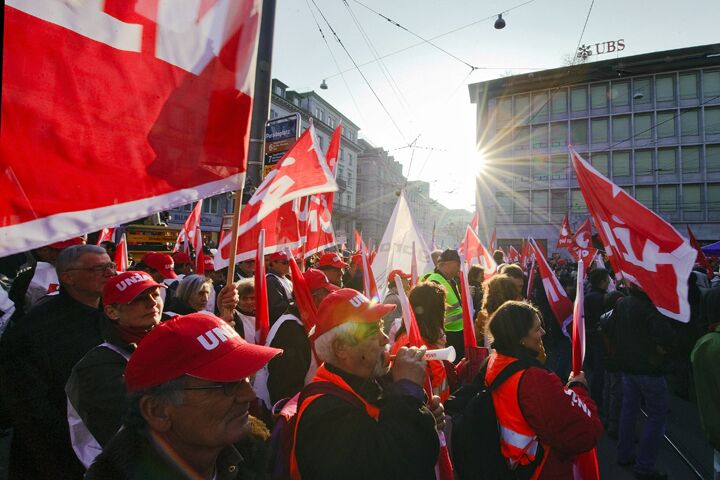
Economic Crisis Grows Politically Dangerous
As devastating as the global credit crunch has been so far, the most dangerous part of the current world economic crisis is just getting underway.
Riots, strikes and civil protest are engulfing the streets of Greece, France, Germany, Egypt, Russia, China and elsewhere. Writing in the Telegraph, Ambrose Evans-Pritchard warns that this turmoil is likely to set off protectionist dominoes around the world and turn the current world order on its head.
“We are advancing to the political stage of this global train wreck,” Evans-Pritchard writes. “Regimes are being tested. Those relying on perma-boom to mask a lack of democratic or ancestral legitimacy may try to gain time by the usual methods: trade barriers, saber rattling, and barbed wire” (emphasis ours).
Dominique Strauss-Kahn, the head of the International Monetary Fund, is worried enough about the effects social protests could have on national governments that he is willing to ditch a half-century of imf orthodoxy and call for a fiscal boost worth 2 percent of world gross domestic product just to “prevent global depression.”
“If we are not able to do that, then social unrest may happen in many countries, including advanced economies,” said Kahn. “We are facing an unprecedented decline in output. All around the planet, the people have reacted with feelings going from surprise to anger, and from anger to fear.”
Evans-Pritchard goes on to say in his article that politicians around the world are falling back on trade barriers as a way to appease their people and ward off social revolution. Consider his comments on rising protectionism in Russia:
Russia has begun to shut down trade as it adjusts to the shock of Ural’s oil below $40 a barrel. It has imposed import tariffs of 30 percent on cars, 15 percent on farm kit, and 95 percent on poultry (above quota levels). “It is possible during the financial crisis to support domestic producers by raising customs duties,” said Premier Vladimir Putin.
Russia is not alone. India and Vietnam have imposed steel tariffs. Indonesia is resorting to special “licenses” to choke off imports. The Kremlin is alarmed by a 13 percent fall in industrial output over the last five months. There have been street protests in Moscow, St. Petersburg, Kaliningrad, Vladivostok and Barnaul. Police crushed “Dissent Marchers” holding copies of Russia’s constitution above their heads in Moscow’s Triumfalnaya Square. ”Russia has not seen anything like these nationwide protests before,” said Boris Kagarlitsky from Moscow’s Globalization Institute. The Duma is widening the treason law to catch most forms of political dissent, and unwelcome forms of journalism. Jury trials for state crimes are to be abolished. Yevgeny Kiseloyov at the Moscow Times said it feels eerily like Dec. 1, 1934, when Stalin unveiled his “Enemies of the People” law, kicking off the Great Terror.
China also is in danger of resorting to protectionist measures, with some 40 million Chinese expected to lose their jobs as the credit crunch increases in the months ahead. Chinese Communist Party officials are already warning of “mass-scale social turmoil.” Evans-Pritchard continues:
Shortly after President Hu Jintao said China is “losing competitive edge in the world market,” we saw a move towards export subsidies for the steel industry and a dip in the yuan peg—even though China already has the world’s biggest reserves ($2 trillion) and the biggest trade surplus ($40 billion a month).
So is the Communist Party mulling a 1930s “beggar thy neighbor” strategy of devaluation to export its way out of trouble? Such raw mercantilism can only draw a sharp retort from Washington and Brussels in this climate. ”During a global slowdown, you can’t have countries trying to take advantage of others by manipulating their currencies,” said Frank Vargo from the U.S. National Association of Manufacturers. It is a view shared entirely by President-elect Barack Obama. “China must change its currency practices. Because it pegs its currency at an artificially low rate, China is running massive current account surpluses. This is not good for American firms and workers, not good for the world,” he said in October. The new intake of radical Democrats on Capitol Hill will hold him to it.
The danger here is that as other nations attempt to cure their economies by walling themselves in with tariffs and trade barriers, the incoming American presidential administration is likely to respond in kind. There has been a lot of talk lately about the Smoot-Hawley Tariff Act, which was enacted by the United States in 1930 as a means of keeping American industrial goods inside America at a time when the economy was ailing. The result, however, was that other nations enacted similar protectionist measures in response, thus creating a scenario wherein the American economy was frozen out of world trade. In the words of Evans-Pritchard, “By resorting to tariffs, it set off retaliation, and was the biggest victim of its own folly.”
The world scene is turning increasingly dangerous and as a result nations are trying to appease their people by looking inward. The Bible foretells of a time when the U.S. is going to be left out in the cold as gigantic trade blocs fuse together in an attempt to freeze the United States out of world trade. Such an economic siege would result in the worst economic depression that America has ever witnessed. For proof of this, read “First Shots of Trade War?” by Robert Morley and The United States and Britain in Prophecy by Herbert W. Armstrong.
